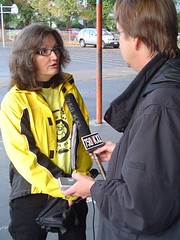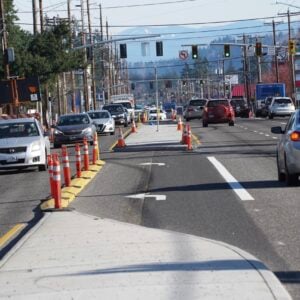The communications issues at the Portland Bureau of Transportation just got worse. After hearing about it yesterday from Bureau sources, I’ve now confirmed with the Mayor’s office that PBOT’s two current communications staffers — Dan Anderson and Cheryl Kuck — are on their way out. No official statements have been made, but sources say Kuck has moved over to the Bureau of Environmental Services and Anderson is taking a job up in Washington.
“Cheryl and I are both leaving the bureau on great terms. The timing is a coincidence,” said Anderson via email this morning.
Communications have long been a trouble spot for PBOT and in recent years a lack of resources and staff at that position has led to a number of PR missteps that have hurt both the bureau and bicycling in general (“Blood in the bike lanes,” “sewer money for bike lanes” and the SE Holgate controversy being just a few examples).
In April 2011, in an address to the City’s Bicycle Advisory Committee, former Bureau Director Tom Miller said, “I think that recently the bureau has suffered and consequently the perception of bicycling has suffered. A large part of this was the lack of effort the bureau has placed on communications. I believe very firmly that PBOT has done very well for bicycling in previous years, but its gotten tarred-and-feathered for it as well. The bureau needs to own up to the fact that we haven’t managed communication as effectively as we needed to.”
Miller believed strongly that in order for PBOT to get over the hump and move forward on projects and policies that would live up to our livable streets reputation, the agency needed more firepower in the communications department. He tried on two separate occasions to hire a senior-level Communications Director; but both times bad politics and bad timing stymied those efforts. Most recently, Mayor Hales publicly put a stop on the high-level PBOT public affairs position Miller was seeking.
Anderson and Kuck have done an admirable job; but neither is at the Director level (their titles were Senior Community Outreach and Information Representatives) and managing communications for such a large agency is a huge job. Instead of working proactively to create positive narratives for PBOT, battle back when stories spin out of control, and garner support for their initiatives among the press and the public, Anderson and Kuck spent most of their time filling information requests, doing media interviews, writing press releases, updating the PBOT website, monitoring social media, and so on.
PBOT has other staff that could fill a communications role, but that would only be a temporary fix (not to mention it would take staff time form other important duties).
Dana Haynes, spokesman for Mayor Charlie Hales, said in an interview today that he’s extremely sad to see both Anderson and Cheryl go. “It’s PBOT’s loss, they were both terrific at their jobs and they’ve been a pleasure to work with for both me and the Mayor.” He said given the upcoming State of the City Address and the finalization of the City Budget in the next few days, Mayor Hales won’t have this issue on his radar for at least another week. In the meantime, Haynes says he’s not sure what they’ll do. “We might go with an interim person, farm it out, I might do some of the work, or I might just get on one knee and beg Cheryl to stay.”
Haynes also said that it’s unlikely any new communications staff would be hired until they select a new PBOT Director — a job left empty when Miller resigned back in January. Hales announced last week that their selection committee has received 44 applications for the position and they hope to have someone hired by May or June.
In the meantime let’s hope there are no bike-related controversies in the next few months.








Thanks for reading.
BikePortland has served this community with independent community journalism since 2005. We rely on subscriptions from readers like you to survive. Your financial support is vital in keeping this valuable resource alive and well.
Please subscribe today to strengthen and expand our work.
Hire Elly Blue for PBOT public information officer.
Which would you rather have, more bike lanes for a $100k/yr mouth piece to tell you why we can’t afford for bike lanes. In my experience (public policy), the “communications” folks tend to retard the process as they fight to justify themselves. A part of the management role is public communications, so having a seperate group usually boils down to CYA for the project and engineering managers. See yah.
Redhippie,
I completely disagree with you on this. Not only is this not an either/or situation; but I happen to think professional communications people are just as important as engineers or planners. One of the main reasons PBOT hasn’t been more bold in recent years is because the public narrative hasn’t been on their side. A lack of good communications has had them playing defense against The Oregonian and business interests and they haven’t done a good enough job telling the story about what they do, what they need to do, and so on. Of course I say this as a former communications professional and as someone who holds media relations and communications in general in very high regard so I’m a bit biased…. But I’ll just end by saying I believe it’s a huge mistake to undervalue the role of communications staff for a major transportation agency. Perception is reality and PR people are the ones who manage, develop, create, and change perceptions.
“Not only is this not an either/or situation…”
Isn’t that exactly what it is? PBOT has a budget. Money they spend on communications doesn’t get spent on the services they provide. They can take the money they spent on these people and spend it either on a) materials they’ll use for additional projects or b) additional personnel to complete a project. The communications folks can’t do anything to increase PBOT’s budget. To me this is a zero sum game.
cyclist… One of the services they provide is communications. Just because you harbor a certain disdain for communications and prefer their service of creating bikeways, doesn’t make communications less valuable. And “The communications folks can’t do anything to increase PBOT’s budget,” could not farther from the truth in my opinion.
In fact, in many ways, your comment is proof that PBOT needs better communications strategy/staff.
Good communications from PBOT could re-frame the narrative around bicycling and position it for what is — a common sense investment in our transportation system that we must take more seriously. Once that message is set and the The Oregonian and the PBA-types are on board, lots more money for building bikeways will open up. Trust me. It’s all politics with this stuff. Fix the politics (which is what communications people can do) and you’ll see money for biking magically appear and/or see us make smarter investments and policies that make bicycling better.
Dan was awesome. Great guy. He’s on our side.
When working in the public policy arena, ideas that have a plain need and merit typically don’t need to be sold to the degree you are advocating. The issue with promoting cycling issues stems more form the fact that cyclists are a minority user of the infrastructure and are seen as recreational users rather than legitimate transportation users. The message PBOT has been failing to promote is the simplicity of transitioning people from the roads to the bike lanes, saving money in infrastructure and easing congestion for everyone.
Regardless of the merits or lack of merits of our discussion, we are coming up on a period where tax revenue is going to be more and more scarce and since a PR person can’t design a road or dig a ditch, they are going to be on the layoff list first. So it does come back to staff vs. infrastructure.
Finally, since the issue of bias was brought up I will offer that most of the public communications staff member I have ever worked with (~10 to 15) come from a journalism background. I have always wondered about how well issues are reported when the reporters might someday seek employment with a PR firm or governmental entity that they are reporting on.
I’m not saying staff should be held free of cuts when times are bad. I’m just saying communications people are very important for public agencies and it’s not an area we can afford to skimp on.
It’s also worth noting that much of the money PBOT uses to build stuff comes from state/federal grants and other outside sources that cannot be used to fund staff.
As to your last point about journalists moving into PR jobs for agencies they cover… I totally hear you. That’s an interesting issue and worth pondering.
“ideas that have a plain need and merit typically don’t need to be sold ”
I’m sorry, but this is just pie-in-the-sky naivety. One only needs to look to the Columbia River Crossing project to see the connection between PR and project viability.
No PR means no bike facilities, like it or not.
Portland continues to lose more every day. Can’t even get a speed reader board on my street due to “budget cuts”. Yet we now have this terrific art tax. Portland: the city that values “art” over public safety.
One less non-productive white collar parasite COULD mean money to patch a few more potholes–which is a win for every road user.